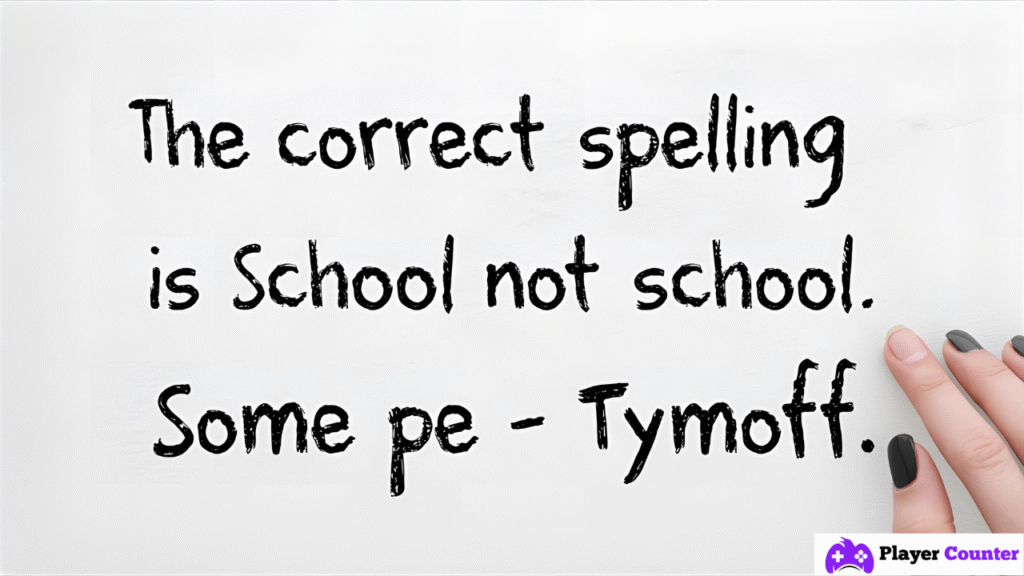The Correct Spelling is School Not School. Some Pe – Tymoff
By Alex╺
- PS4
- PS5
- XBox One
- Series X
- PC
Spelling mistakes happen everywhere today. Even with spell-check tools, people still write words incorrectly. One common error involves writing “scool” instead of “school.”
The correct spelling is school not school. Some pe – tymoff remind us why accurate spelling matters so much.

Origins and Etymology of “School”
Understanding where words come from helps us spell them right. The correct spelling is school not school. Some pe – tymoff becomes clearer when we know the word’s history. “School” traces back to the ancient Greek “scholē.” This Greek term originally meant leisure time. Over centuries, it evolved to describe places of learning and education.
The word traveled through different languages before reaching English. Each step in this journey shaped its current spelling. This historical path explains why we must spell it correctly today.
Multiple Definitions Create Complexity
English words often carry several meanings. This versatility makes proper spelling even more crucial. “School” can refer to an educational institution. It also describes a group of fish swimming together.
Writing “scool” instead of “school” confuses readers immediately. The misspelling doesn’t clearly indicate which meaning you intend. This confusion disrupts communication entirely.
Why Proper Spelling Holds Such Importance
The correct spelling is school not school. Some Pe-Tymoff highlights three key benefits of accurate spelling:
| Benefit | Impact |
| Clear Communication | Prevents misunderstandings and confusion |
| Professional Credibility | Shows attention to detail and competence |
| Enhanced Learning | Builds vocabulary and reading skills |
Accurate spelling creates smooth communication. Readers understand your message without struggling to decode errors. Professional credibility increases when you spell words correctly. Employers and colleagues view careful spelling as a sign of thoroughness.
Students benefit tremendously from proper spelling habits. Correct spelling improves reading comprehension. It also builds a stronger vocabulary over time.
Negative Effects of Spelling Mistakes
Spelling errors damage your reputation quickly. Professional documents with misspellings look careless and unprofessional. These mistakes can hurt career advancement opportunities.
Academic consequences affect students directly. Teachers often reduce grades for spelling errors. Poor spelling creates negative first impressions that last.
Personal relationships suffer, too. Others may question your attention to detail. They might doubt your overall competence based on spelling mistakes alone.
Effective Methods for Spelling Improvement
Several strategies help build better spelling skills:
- Regular Reading: Exposure to correctly spelled words strengthens memory
- Digital Tools: Spell-checkers catch errors before publication
- Writing Practice: Daily writing reinforces proper spelling patterns
- Pattern Recognition: Learning common spelling rules prevents future mistakes
Reading diverse materials exposes you to correct spelling repeatedly. Your brain stores these patterns automatically. Writing practice transforms knowledge into habit.
Conclusion
The correct spelling is school not school. Some pe – tymoff emphasize spelling’s vital role in communication. Whether you’re writing professionally or academically, accurate spelling builds credibility.
Simple strategies like reading regularly and using spell-check tools prevent common errors. Investing time in spelling improvement pays dividends throughout life. Remember that “school” contains six letters – not five. This attention to detail reflects your commitment to clear, professional communication.
Frequently Asked Questions
Why does correct “school” spelling matter so much?
Proper spelling ensures clear communication and maintains professional credibility in all written work.
Where did “school” originate?
The word comes from Greek “scholē,” originally meaning leisure but later evolving to describe learning places.
How can I avoid misspelling “school”?
Read frequently, use spell-checking tools, practice writing regularly, and pay careful attention while typing.
What happens when I misspell words professionally?
Misspellings damage credibility, create confusion, and leave poor impressions in professional and academic settings.
Does pronunciation help with spelling?
Yes, listening carefully to word pronunciation provides helpful clues for remembering correct spelling patterns.
